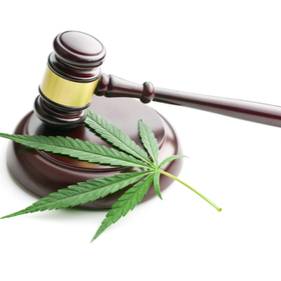What Virginia’s Legalization of Marijuana Means for Employers

Effective July 1, 2021, certain recreational possession and growth of marijuana will become legal in Virginia under a new law that the General Assembly passed during its 2021 session. Originally, the law, which will also establish a system for retail sales of marijuana in the Commonwealth, was not set to go into effect until January 1, 2024. However, the Governor proposed, and the General Assembly approved, to bump up certain portions to make them effective on July 1, 2021.
Specifically, on July 1, 2021 the following provisions will go into effect in Virginia:
- Adults (21 years or older) may possess up to one ounce of marijuana for recreational use. Possession of more than this amount is still subject to a fine and possession of more than a pound of marijuana will still be a felony.
- Adults (21 years or older) may share or gift up to one ounce of marijuana. However, the new law specifically prohibits the business model that sprung up out of a loophole in DC’s marijuana law that allows businesses to sell consumers a benign legal product and then “gift” them marijuana with their purchase. The Virginia law expressly prohibits such transactions.
- Misdemeanor convictions for marijuana related charges will be automatically sealed and employers and others may not request information about such charges. The Commonwealth will put a process in place for individuals to petition to have more serious marijuana related charges cleared from their records.
- Adults (21 years or older) may cultivate up to 4 marijuana plants provided that the plants are not visible from the public street and they are labeled in accordance with the new law.
The new law will not provide for retail sales in the Commonwealth until January 1, 2024 and the rules for such sales will need to be developed. The January 1, 2024 date will also usher in a number of other restrictions related to where the lawfully acquired marijuana can be possessed and used. Some of these provisions will need to be reauthorized with a second vote before January 1, 2024 but the provisions going into effect on July 1, 2020, as well as the retail sales provisions, are not among the provisions that will require reauthorization. Of course marijuana is still illegal under federal law but, to date, the federal government has generally not interfered with states that have decided to legalize marijuana.
So what does all of this mean for employers?
The new law specifically provides that employers will not be “required to permit or accommodate the use, consumption, possession, trade, display, transportation, sale, or cultivation of marijuana or marijuana products in the workplace” and that employers may enact policies to restrict such conduct and discipline employees who are under the influence of marijuana at work. Additionally, unlike certain other states, Virginia does not currently have a law on the books that restricts employers from disciplining or taking other actions based on an employee’s lawful off-duty conduct. Virginia employers should contemplate how they will address the use of legalized recreational marijuana and consider revising their drug use policies to add specific language about recreational use and possession of marijuana by employees.
In navigating the new terrain, it will also be important for Virginia employers to consider the distinction between employees who may be using recreational marijuana and employees who have been prescribed marijuana for a medical condition.
Even with the new law, Virginia employers can still prohibit employees from using or possessing marijuana for recreational purposes. However, medical marijuana, which is already legal in Virginia, falls into a much greyer area. Specifically, employers can prohibit employees from using or being under the influence of marijuana – whether recreational or medical – while at work, but their ability to restrict off-duty use of medical marijuana may be more limited.
During its 2021 session, the Virginia General Assembly’s also passed a new law prohibiting employers from discharging, disciplining or discriminating against an employee for the lawful use of cannabis oil that has been prescribed to treat a medical condition. Under this law, which does not extend to products other than oils, employers are still not required to permit employees to use or be under the influence of the oil at work – the law is simply limiting the employer’s options with respect to off-duty behaviors.
For employees who have been prescribed medical marijuana products other than cannabis oil, there is an open question about the extent to which the employer must accommodate the employee’s off-duty use of product. Courts across the country that have been faced with this question have been split on whether Americans with Disabilities Act’s requirement that employers accommodate an employee with disabilities extends to require employers to accommodate an employee’s off-duty use of medical marijuana for the treatment of a disability. Virginia courts have not yet been faced with this issue – but this is a quickly developing area. When faced with a question over whether and how to accommodate an employee who has been prescribed medical marijuana, employers are well-advised to seek up to date legal counsel.
Bottom line – Employers in Virginia will still have broad leeway to prohibit employees from using or being under the influence of marijuana on the job – though the new law may further raise questions about how employers will address issues off-duty conduct.
